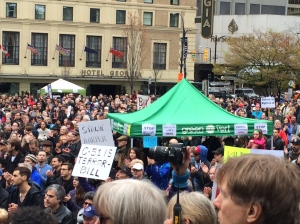“To every man is given the key to the gates of heaven; the same key opens the gates of hell.” – As told to Richard Feynman (Theoretical physicist) by a Buddhist monk.
The search query Bill C-51, leaves me wondering how quickly the Canadian Security Intelligence Service (CSIS) or the Communications Security Establishment Canada (CSEC) will come to know about my curiosity. Other than that simple search term what else do they know, or what else do they think they know? What more can they find out about my interest in the subject?
 Like thousands of other Canadians, by attending a weekend rally that was vociferously against the attempt to pass this omnibus bill, I’ve knowingly exposed myself even further to the mechanisms of State surveillance. I’ve been surveilled without context. It’s just like searching the internet is now an act of being surveilled without context.
Like thousands of other Canadians, by attending a weekend rally that was vociferously against the attempt to pass this omnibus bill, I’ve knowingly exposed myself even further to the mechanisms of State surveillance. I’ve been surveilled without context. It’s just like searching the internet is now an act of being surveilled without context.
Think back in history, even before surreptitiously cracking a wax sealed envelope and peaking into its contents, communication technology and surveillance have long been strange bedfellows.
Ultimately the mechanisms of State surveillance are rooted in the manipulation of, and projection of power. “The increased power of officials is an inevitable result of the greater degree of organization that scientific technique {communications technologies} brings about. It has the drawback that is apt to be irresponsible, behind-the-scenes, power, like that of Emperors’ eunuchs and the Kings’ mistresses in former times. To discover ways of controlling it is one of the most important political problems of our times” – Bertrand Russell (The Impact of Science on Society – 1953)
This “Act (Bill C-51) that may be cited as the Anti-terrorism Act, 2015” is being fast tracked to becoming (in it’s own words), “An Act to enact the Security of Canada Information Sharing Act and the Secure Air Travel Act, to amend the Criminal Code, the Canadian Security Intelligence Service Act and the Immigration and Refugee Protection Act and to make related and consequential amendments to other Acts.” This is a significant legislative overhaul. This will make us no safer nor more secure tomorrow that we already are today. This is nothing more than a security services power grab.
Bill C-51 is full of murky definitions and offers a troublingly broad definition of what constitutes “threats to the security of Canada.” According to our Prime Minister’s hyperbole ““Jihadist terrorism is not a future possibility, it is a present reality,” Harper said at the announcement. “It seeks to harm us here in Canada, in our cities and in our neighbourhoods through horrific acts.”
Yet, let’s look for these sources of terror. This ominous spectre of terror that’s lurking in shadowy corners and looming over our country, the terrorist threat we all need to fear according to CSIS, is the one that’s “emanating from Al-Qaeda-inspired extremism… Despite recent successful operations targeting Al-Qaeda Core, the Service continues to see support for AQ causes in Canada. Of particular significance is the above-mentioned investigation into an alleged Al-Qaeda-linked plot to attack a train in Southern Ontario, which led to the arrest of two individuals in April 2013.” It’s important noting that this lone terrorist plot was foiled using today’s current surveillance methods and within today’s legislative framework.
I accept that Google, Facebook, and Apple possess a potential treasure trove data points about me. I can accept what these corporations know about me because they can’t bankrupt me; they can’t incarcerate me; they can’t potentially ruin my life. The state can.
I’m not keen on feeling powerless to defend myself against the mechanisms of our State surveillance and security authorities. What does the Canadian State surveillance and security system know about me right now? It’s haunting to think that a faceless and nameless bureaucrat can take shards and fragments of information, of metadata and create a story that’s not mine. The state can create their own narrative for each of us. One day we might find ourselves no longer free to create and communicate our own narrative.
This story of safety, security, and terrorism is supposed to be about trusting our government. We’re supposed to believe that giving up more freedom and privacy is good for us. How is the imposition of self-censorship good for us? Do I have to consider how framing a dissenting perspective about the federal government could be taken out of context? Can my suggesting that we have a government that’s displayed total lack of environmental stewardship while schilling our natural resources to interests that best suit a myopic and greedy fiscal agenda, be potentially deemed a “threat to the security of Canada?”
 As well, this state abuse of communications technology could further curtail our freedom of movement. The no-fly list is nothing new, but under the new version of this law authorities will be permitted to use undisclosed secret evidence against suspects. Again we’ll be left powerless to defend ourselves.
As well, this state abuse of communications technology could further curtail our freedom of movement. The no-fly list is nothing new, but under the new version of this law authorities will be permitted to use undisclosed secret evidence against suspects. Again we’ll be left powerless to defend ourselves.
The internet is a door that opens two ways. While we can see a world of good and evil, we also have to allow for the reality that this door also lets both walk through it too. One of those evils should not be our own supposedly democratically elected government. Echoing Edward Snowden, government needs to recalibrate it’s relationship with us. That relationship can not be defined as those ruling the ruled; it must be one that’s between the electorate and the elected. Bill C-51 is about being ruled. It’s the real looming spectre of terror that’s in our midst today.
“There can be no doubt that behind all the pronouncements of this court, and in my case, behind the arrest and today’s inquiry, there exists an extensive organization […] And the purpose of this extensive organization, gentlemen? It consists of arresting innocent people and introducing senseless proceedings against them, which for the most part, as in my case, go nowhere. Given the senselessness of the whole affair, how could the bureaucracy avoid becoming entirely corrupt?” (Kafka – The Trial)
